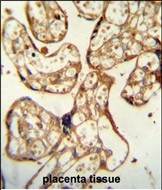PSG9 Antibody (Center)
Affinity Purified Rabbit Polyclonal Antibody (Pab)
- SPECIFICATION
- CITATIONS
- PROTOCOLS
- BACKGROUND

Application
| IHC-P, WB, E |
|---|---|
| Primary Accession | Q00887 |
| Other Accession | NP_002775.3 |
| Reactivity | Human |
| Host | Rabbit |
| Clonality | Polyclonal |
| Isotype | Rabbit IgG |
| Calculated MW | 48272 Da |
| Antigen Region | 108-137 aa |
| Gene ID | 5678 |
|---|---|
| Other Names | Pregnancy-specific beta-1-glycoprotein 9, PS-beta-G-9, PSBG-9, Pregnancy-specific glycoprotein 9, PS34, Pregnancy-specific beta-1 glycoprotein B, PS-beta-B, Pregnancy-specific beta-1-glycoprotein 11, PS-beta-G-11, PSBG-11, Pregnancy-specific glycoprotein 11, Pregnancy-specific glycoprotein 7, PSG7, PSG9, PSG11 |
| Target/Specificity | This PSG9 antibody is generated from rabbits immunized with a KLH conjugated synthetic peptide between 108-137 amino acids from the Central region of human PSG9. |
| Dilution | IHC-P~~1:50~100 WB~~1:1000 E~~Use at an assay dependent concentration. |
| Format | Purified polyclonal antibody supplied in PBS with 0.09% (W/V) sodium azide. This antibody is purified through a protein A column, followed by peptide affinity purification. |
| Storage | Maintain refrigerated at 2-8°C for up to 2 weeks. For long term storage store at -20°C in small aliquots to prevent freeze-thaw cycles. |
| Precautions | PSG9 Antibody (Center) is for research use only and not for use in diagnostic or therapeutic procedures. |
| Name | PSG9 |
|---|---|
| Synonyms | PSG11 |
| Function | Binds to the small latent transforming growth factor-beta complex, consisting of the N-terminal TGFB1 latency-associated peptide (LAP) and the mature form of TGFB1, thereby leading to the activation of TGFB1 (PubMed:27389696). The activation of TGFB1 leads to stimulation of naive CD4(+) T-cells to increase FoxP3 expression and to an increase in the number of FoxP3(+) regulatory T-cells (PubMed:27389696). Induces the differentiation of a suppressive CD4(+)LAP(+)FoxP3(-) T-cell subset (PubMed:27389696). Induces the secretion of TGFB1 in macrophages, but not in activated CD4(+) T-cells (PubMed:27389696). May reduce the expression of several pro- inflammatory cytokines and chemokines by CD4(+) T-cells, including IL2 and IL6 (PubMed:27389696). |
| Cellular Location | Secreted. |

Thousands of laboratories across the world have published research that depended on the performance of antibodies from Abcepta to advance their research. Check out links to articles that cite our products in major peer-reviewed journals, organized by research category.
info@abcepta.com, and receive a free "I Love Antibodies" mug.
Provided below are standard protocols that you may find useful for product applications.
If you have used an Abcepta product and would like to share how it has performed, please click on the "Submit Review" button and provide the requested information. Our staff will examine and post your review and contact you if needed.
If you have any additional inquiries please email technical services at tech@abcepta.com.













 Foundational characteristics of cancer include proliferation, angiogenesis, migration, evasion of apoptosis, and cellular immortality. Find key markers for these cellular processes and antibodies to detect them.
Foundational characteristics of cancer include proliferation, angiogenesis, migration, evasion of apoptosis, and cellular immortality. Find key markers for these cellular processes and antibodies to detect them. The SUMOplot™ Analysis Program predicts and scores sumoylation sites in your protein. SUMOylation is a post-translational modification involved in various cellular processes, such as nuclear-cytosolic transport, transcriptional regulation, apoptosis, protein stability, response to stress, and progression through the cell cycle.
The SUMOplot™ Analysis Program predicts and scores sumoylation sites in your protein. SUMOylation is a post-translational modification involved in various cellular processes, such as nuclear-cytosolic transport, transcriptional regulation, apoptosis, protein stability, response to stress, and progression through the cell cycle. The Autophagy Receptor Motif Plotter predicts and scores autophagy receptor binding sites in your protein. Identifying proteins connected to this pathway is critical to understanding the role of autophagy in physiological as well as pathological processes such as development, differentiation, neurodegenerative diseases, stress, infection, and cancer.
The Autophagy Receptor Motif Plotter predicts and scores autophagy receptor binding sites in your protein. Identifying proteins connected to this pathway is critical to understanding the role of autophagy in physiological as well as pathological processes such as development, differentiation, neurodegenerative diseases, stress, infection, and cancer.



